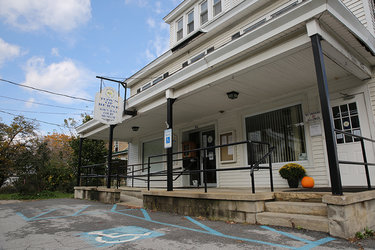Both Berne and Councilman Thiem received building permits from unqualified worker
BERNE — After ignoring a code-enforcement officer’s warning that the town’s building inspector was not qualified to carry out certain enforcement activities, Berne received a building permit from that inspector anyway, as did town board member Albert Thiem.
Thiem’s permit was issued on April 13, the same day that code enforcement officer Kevin Flensted resigned over his frustrations that the town was willingly going against New York State regulations, records obtained through a Freedom of Information Law request show.
Building inspector Jon Heigel issued the town’s permit on April 26.
Flensted confirmed for The Enterprise that he had not signed off on these permits, which makes them invalid. He said that Thiem’s project — a carport — had insufficient detail to qualify for a permit.
It’s not clear what the town project is, though it’s described as an “addition” in the permit application document, which is also how Thiem’s project is described.
Thiem, Heigel, and Berne Supervisor Dennis Palow could not immediately be reached.
Other town records show that Heigel has conducted 48 final inspections in Berne since September of last year. The board had voted to hire him that April.
State regulations allow only code-enforcement officers to approve a construction project. Building inspectors are relegated to “fire safety and/or property maintenance inspections of existing buildings and structures.”
Some of Heigel’s inspections related to smaller structures, like garages and sheds, while at least two were of new single-family homes, the records show.
The Enterprise was not immediately able to reach those homeowners.
The Enterprise first reported last week that Heigel and building department employee Chance Townsend were performing work outside of their qualifications, after the newspaper had received a copy of Flensted’s resignation letter from the town, which addressed the issue.
In his letter, Flensted wrote that he “cannot sign off for work done by another inspector that was not qualified to do the work.”
“I informed the town supervisor, provided the standard, had the state provide the standard, but the supervisor feels he understands the standard better than I do,” Flensted had told The Enterprise last week.
Palow said that Flensted’s assertions were “bogus,” which contradicts the increasing amount of documentation that The Enterprise has in its possession, including a photo of the town’s work-management system that backs up Flensted’s assertion.
The New York State Department of State would not confirm whether the town was under investigation for this activity, but did say that investigations are conducted when there’s evidence that “administration and enforcement of the codes does not meet the minimum requirements found in regulations.”
“The Codes Division also investigates complaints against a Code Enforcement Official (CEO) or Building Safety Inspector (BSI), where there is evidence that an individual has materially failed to uphold their code enforcement duties,” the Department of State told The Enterprise in an email. “A list of specific items which are considered as a material failure to uphold code enforcement duties are found in Part 1208 of Title 19.”
Among the items listed as a violation is a code-enforcement officer performing “any code enforcement activity at a time when his or her certification is inactive or suspended.”
The consequence of such an investigation, if it confirms a failure in enforcement, is the revocation of the subject’s license.
While Heigel is qualified as a building inspector, Townsend was not qualified in any capacity, insofar as the state is concerned. Townsend is no longer employed with the town as of last month, according to the town’s website, though it’s unclear why.
Townsend had formerly been certified as a code-enforcement officer, but he had let his certification lapse for the bulk of 2020. He renewed his certification for 2021, but let it lapse again this year, the Department of State told The Enterprise last week.
The state wrote in an email to The Enterprise that erroneous permits can be retroactively validated by having a certified code-enforcement officer sign off on the work that was done.



